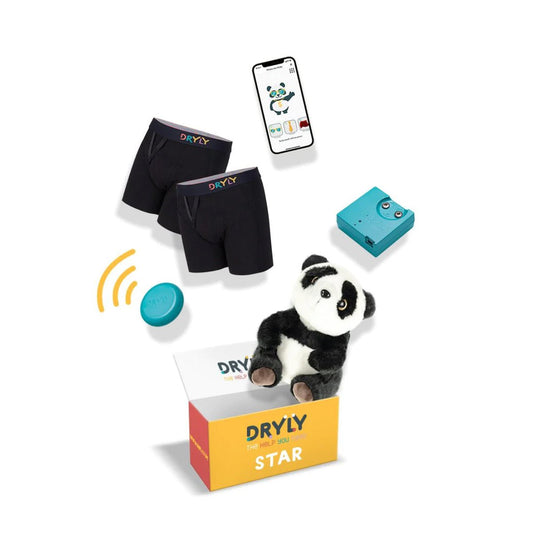Cause bedwetting, why does my child wet the bed?
Bedwetting is more common than you think, about 1 in 10 children as young as 6 years old regularly wet the bed. Fortunately, it is usually easily treatable, but to effectively address bedwetting, it is important to fully understand the causes of bedwetting. In this article, we explain why children may wet the bed at night and what can be done about it.

Cause group 1: Physical causes of bedwetting.
These causes have to do with the body and the way urine is produced and stored.
1. Reduced production of ADK hormone.
Some children do not make enough antidiuretic hormone (ADH) at night. This hormone causes the kidneys to produce less urine at night. As a result, the bladder fills more quickly and a child wets the bed more quickly.
2. Small (functional) bladder capacity.
In some children, the bladder still struggles to hold enough urine for the entire night, this may be due to tension in the pelvic floor or increased sensitivity.
3. Obstipation (constipation).
A full rectum presses against the bladder, causing the bladder to function less well. This is a common cause for the problem, but this is often overlooked as a cause of bedwetting.
4. Urinary tract infections
With a bladder infection, the child may have difficulty controlling the bladder, including at night. Usually a urinary tract infection is temporary, but important to follow up medically.
Cause group 2: Sleep- and developmentally-related causes of bedwetting.
These causes are linked to neurodevelopment and children's sleep patterns.
5. Deep sleep/delayed waking mechanism.
Some children sleep so deeply that the signal of a full bladder does not get through. These children simply do not wake up while urinating in sleep, even though the bladder is full.
6. Slow neurological maturation
Bladder control logically develops differently in each child. In some children, it takes longer for the signals between the brain and the bladder to work properly and be picked up. Especially at night, the bladder has difficulty with this.
Cause group 3: Genetic and hereditary factors
7. Heredity
Did one of the parents used to be a bedwetter? Then there is up to 40% more chance that the child will also have problems with bedwetting. If both parents have suffered from this, the chance is as high as 70%. So bedwetting can run in the family, which is nothing to be ashamed of! Read more about the heredity of bedwetting.
Cause group 4: Medical and neurological causes (rarely)
Although bedwetting usually has no psychological cause, emotions can affect a child's potty training.
8. Stress or major changes
Stress and major changes can greatly affect a child's bedwetting behavior, consider situations such as:
- A move
- Divorce
- Birth of a sibling
- Stress at school
These factors can exacerbate or re-initiate bedwetting.
Causes group 5: Medical and neurological causes
9. Neurological disorders or anatomical abnormalities.
In rare cases, bedwetting is a result of a medical condition, such as the examples below:
- Spina bifida (spina bifida)
- Neurological damage
- Congenital abnormalities of the urinary tract
This is often accompanied by daytime symptoms; if this is the case, always contact a doctor to have it looked at.
Summary table, causes of bedwetting
| 🗂️ Category | 💡 Cause | 📝 Brief explanation |
|---|---|---|
| Physical | Decreased ADH | Too little hormone → lots of urine |
| Small bladder capacity | Bladder does not hold urine well | |
| Obstipation | Bowel pressure on bladder | |
| Urinary tract infection | Bladder infection | |
| Sleep & development | Deep sleep | Does not wake up |
| Delayed maturation | Bladder and brain not aligned | |
| Hereditary | Family history | Parents also urinated |
| Psychosocial | Stress | Stresses or changes |
| Medical | Neurological disorders | Nerve problems |
| Anatomical abnormalities | Congenital problems |
How do you recognize the cause of bedwetting?
Recognizing the cause of bedwetting begins with proper observation. Age plays an important role, up to 5 years old, bedwetting is usually normal and part of development. So if your child is in their late 5s or older than 6 and still wets the bed regularly, it is a good idea to look into this further.
Pay attention to sleep patterns, children who have difficulty waking up or sleep deeply at night often do not feel the urge. This may indicate a delayed waking mechanism. Daytime behavior also says a lot. If your child has no accidents during the day, then the cause is less likely to be physical. But if there are also signs during the day such as small bits of urination, abdominal pain or constipation, then there may be bladder problems or constipation.
Stress and the changes in the home situation (move, divorce, tension at school) can temporarily worsen bedwetting, especially if the child has previously been dry for long periods of time. Don't forget heredity, if one of the parents used to be a bedwetter. Chances are then good that this will also occur in your child.
By paying close attention to these signs, you as a parent will quickly gain more insight. Extra tip: keep a pee diary. This will help you see patterns and assess causes and provide valuable information if you decide to seek help.
When is it wise to seek help?
So bedwetting is normal up to a certain age, but there are some signs you should watch for. When your child starts to turn 5/6 years old and the bedwetting persists, this may be a reason to keep an eye on it. Also when bedwetting suddenly starts again after a long dry period and/or complaints and accidents are experienced during the day.
Finally, if a medical cause such as infection or constipation is suspected, it is also wise to seek help. In doubt about whether it is necessary? Then just contact your doctor or a urotherapist!
What can you do as a parent?
Fortunately, there are fine ways developed to properly address bedwetting, especially if you know the cause of bedwetting. The Dryly Bedwetting Alarm helps children learn to wake up at urges and addresses the problem effectively and child-friendly. Wizzu the panda bear takes your child by the hand to become potty trained within 6 to 8 weeks. Combined with the handy app, you can make the process insightful and extra fun!
Check out our child-friendly bedwetting alarm, or read more about how our method works!
Frequently asked questions causes of bedwetting
What are the most common causes of bedwetting?
Bedwetting is often caused by a combination of factors such as a small bladder, deep sleep, heredity and sometimes stress.
Consequently, these are the most common causes.
Can bedwetting occur without a clear cause?
Yes, in many children there is no obvious medical cause, it may have to do with bladder and nerve development.
Does heredity always play a role in bedwetting?
Not always, but children with history are more likely to have bedwetting.
-
Dryly® Bedwetting Alarm Star
Normal price 199.99Normal priceUnit Price / per255.95Offer price 199.99- Guidance via mobile app
- Underwear plain 2-pack
- Optional vibration function
- Wizzu (panda cuddly toy)
- Transmitter & receiver
Sale -
Dryly® Bedwetting Alarm Hero
Normal price 229.99Normal priceUnit Price / per278.94Offer price 229.99Most chosen- Guidance via mobile app
- Underwear plain 3-pack
- Optional vibration function
- Wizzu (panda cuddly toy)
- Transmitter & receiver
Sale -
Dryly® Bedwetting Alarm Superhero
Normal price 259.99Normal priceUnit Price / per330.92Offer price 259.99Best deal- Guidance via mobile app
- Extra mattress protector
- Underwear plain 2-pack
- Underwear print 2-pack
- Optional vibration function
- Wizzu (panda cuddly toy)
- Transmitter & receiver
Sale
Frequently asked questions toilet training at night
From what age do you start toilet training at night?
There is no set age at which to begin nighttime potty training. Each child develops at his or her own pace. A good time is when your child is potty trained during the day, and has motivation to work on this himself. This usually begins from the age of 5 years old.
What if my child continues to bedwash at night despite nighttime training?
If bedwetting persists longer, such as after age 6, there may be nocturnal enuresis. This is often not psychological, but physical in nature. A bedwetting alarm is an effective aid. When in doubt, you can always consult a doctor.
Does it help to drink less before sleeping?
Limiting fluid intake before bedtime can sometimes help, but it is important to do so in a healthy way. Give your child plenty to drink during the day, and avoid sugary drinks in the evening. Always make sure your child pees before bedtime!
Is the use of a bedwetting alarm effective?
Yes, pee alarms have been used effectively in nighttime potty training for decades. A bedwetting alarm helps children become aware of the sensation of a full bladder. This helps children gain a lot of confidence and speeds up the process considerably.






